- Home
- Perry Rhodan
The Last Days of Atlantis Page 7
The Last Days of Atlantis Read online
Page 7
On the larger continents to the East and West of Atlantis, top specialists had erected stone fortresses, pyramid-shaped silos and other such emergency stations and billets. What we had in mind was that in case of a major attack we would evacuate the intelligent native peoples from the equatorial zone of the planet.
Aircraft were standing by in case it was necessary to also evacuate the deployed crews from their gun positions, in those areas where we might expect an interzonal meshing of the two time-planes. For the Arkonide settlers in Atlantis an undersea bio-survival dome had been constructed. In an emergency we could quickly house up to 10,000 people inside the dome. On the second planet of Larsaf's Star it had been revealed that fish and other water-based life forms were not entrapped by the relative-energy front, as long as they remained in the, depths. This had been a valuable discovery for us.
However, all of our preparations had been made against the possibility of a normal passage of the dimension overlap. But if from here on the unknown enemy was going to be able to make a direct entry into our own continuum, the situation would take on a much darker complexion. Then it would be a matter of life and death.
I took a last look upwards at the blistered and partly melted battle sear in the side of the damaged flier. Then I turned to the waiting men. "The Tosoma and Paito are on ready alert status. Commanders will go on board. We will make an armed reconnaissance flight near the orbit of Larsa. Feltif, get your ground commandos into the gun stations and bring the impulse-cannons to idling level. Tarth set up a hypercom connection with the Imperator. The text of the message will be given to you shortly. Native inhabitants will be evacuated. Unfortunately families will have to be separated wherever the Arkonide married men belong to ship crews or gun crews.
I glanced at Inkar out of the corner of my eye. I had heard he was supposed to be happily married. The young commander stared straight ahead without a quiver on his face but I knew that my orders must have weighed heavily on him.
"The Arkon colonists are to be advised to make all necessary preparations for a flight into remote land areas. Henceforth our headquarters are transferred to the submarine pressure dome, which the engineering teams are to make ready for occupancy."
I looked at my watch. It was a little after mid-day. The yellow-white sun stood at its zenith above the spaceport. It was a beautiful, Arkon-kind of world with every prospect for a magnificent development. And in that moment I resolved to defend this third planet with every means at my disposal.
"Takeoff in one hour," I announced. "The instrument readouts from the TO-4 are to be brought to me at once.
I raised my hand to the men. Silently they bowed their heads. Whatever could be said at this time had been said.
Tarth, who was also Chief of Staff, walked beside me to the ground car. The old man's towering figure was a symbol of staunchness and strength. Since he had received his rejuvenation treatments his step had become livelier and more supple.
As I was about to get into the car, Tarth suddenly spoke to me. "Atlan, if it were a normal time-zone overlap we could easily avoid it because of its negligible speed. But now our only chance is to make an all-out attack and to hit them hard! If we wait around until they come at us out of that trick funnel of theirs, we are lost!"
"I know," I agreed calmly. "That's why the takeoff is set. I'm just afraid that both effects will occur at once. It's imperative that our most indispensable ships be in deep space, if there's going to be a zonal overlap at the time of opposition of the two planets. But right now the main thing is to see those instrument readouts from the TO-4. Let's hold everything as is for the moment."
As we drove off we knew that we were going against our better judgment. Come what might, I was' determined to make a thrust through the field-stabilization funnel in order to make one grand blasting attack of annihilation.
Before us loomed the magnificent buildings of Atlopolis, the capital city of Atlantis. It was the cultural and commercial center for our widely dispersed colonists, who had settled practically the entire continent.
Our escort vehicles cleared the way with shrill whistles. The natives, who were colorfully dressed in hand-made fabrics, sank reverently to their knees. It was always distressing to me to see people at this stage of intelligence act so submissively. However, Tarth and the colonial commandos considered a certain amount of glorification to be essential.
To my surprise I heard old Tarth grumble out an unusual suggestion: "We ought to try to train and improve the most intelligent men of this race with accelerated hypno-schooling. That's one way of finding out if they have the mental capacity at this stage to understand our technology."
I nodded with some sense of irony. My old fire-eater was gradually becoming more dove-like in his old age. Tarth had formerly counted himself among those Arkonides who landed on alien worlds and loaded their cannons before they said hello.
"Such a program has already been established," I replied.
"Huh...?"
I was amused by Tarth's nonplussed expression. As we sped along the broad, winding avenues toward my administrative palace, I noticed that his sharp old eyes examined the natives who were working along the verdured parkways. These tall, brown-skinned people were physically quick and strong. Whether or not their brains had developed as splendidly as their bodies would be revealed through our first experiments with the highly secret hypnotic accelerated education machines.
A thundering arose from the now distant spaceport. The thrust engines of the mighty Tosoma generated a fiery wreath of superheated air masses. If I had possessed 10 ships of her class I'd have felt a lot better.
Forty minutes later the instrument data recorded by Lt. Kahene were transmitted to me over the video intercom system. The flagship's positronicon had worked swiftly and dependably.
Kosol, my new chief mathematician, was at the transmitter end. "It is a large-scale natural phenomenon, Eminence, which may be repeating itself about every five billion years. The two time-planes seek a mutual stabilization level, which implies a discharge of energy from the dimension having the higher state of force tension, volume-wise. Those outlet funnels are identical to unstable energy fields of much wider magnitude. They provide an assimilation of differentials in opposed field currents. Practically described, they are virtual conductors. It's conceivable that the aliens over there have grasped this fact on a mathematical basis and put it to practical use for their own purposes. The quick thrust made simultaneously by the four spaceships indicates that they knew the exact moment of penetration. By the same token, it seems they also can figure out when to return."
"And what are the prospects to be extrapolated from this?" I asked grimly.
"Not good for us, Your Eminence. In about 14 days a stage of complete mutual balance will be reached. What we can infer from that is that the previous state of instability will take on a stabilized condition that may be constant for weeks or even months."
There was no need for Kosol to tell me more. I thanked him and cut off the connection. Tarth stood beside the great windows of my office and brooded out at the panorama beyond. We were alone. With slow deliberation he said: "We have two possibilities. If we flee from here this world will be spared from a nuclear inferno but the organic life here including the people would then disappear without a trace. And that would cause an interruption of natural development. But if we put up a resistance, things will really get hot—mark my words! It's possible for #3 to be turned into a glowing oven."
He looked at me pensively as I answered him calmly: "You took the words out of my mouth, old friend. I'll have to chance it. Even if half of this world is destroyed there will still be enough livable areas left to save the present intelligences from an ultimate doom. However, we shall attempt to repel the enemy."
Tarth said no more. His broad hand clapped loudly against the left side of his chest. His commander's radio helmet, decorated with planetary symbols, was clamped tightly under his arm as he strode stiffly toward the door.
As I was leaving my headquarters, the Paito was already blasting through the brilliant blue skies over Atlantis. Below in the great harbor of the island continent, the native fishermen and merchant sailors frantically reefed in the colorful sails of their wooden ships. From sad experience they had learned how devastating the shockwaves from a large ascending spaceship could be.
At the ground-level airlock of the Tosoma a fleet ceremony met me with the usual demonstration of homage. Tarth placed great value on usage and custom. Three minutes later the impulse converters of the 15 remaining propulsion engines were cautiously extended. We took off in a torrent of sound that was like an erupting volcano.
Empty space opened before us. The third planet fell away and quickly became a shimmering ball of reflected light. Owing to the conversion of three propulsion units into hyperdimensional energy projectors, it now required almost 13 minutes for us to reach the natural speed of light. So the old Tosoma was no longer the kind of ship that should be waging a modern space war. We flew a direct course toward Larsa, the second planet of the system. The primeval jungle world was supposed to have been stripped bare not only of all human life, according to reports, but of most of its animal life as well. Due to the numerous passages of the relative-energy front, all creatures had been dragged into the other time-plane. We were not particularly fond of the idea that Larsaf #3 should suffer a similar fate.
5/ PREPARING FOR BATTLE
Everything worked out quite differently from what I had imagined. Those energy discharge formations that mathematician Kosol had called 'outlet funnels' turned out to be unpredictable in their nature. Whenever such a phenomenon occurred we never knew exactly how long it would hold.
Our ship's positronicon was one of the most modern calculation units in the Greater Empire. In spite of this it was unable to determine the definite intervals of the occurrences or even to approximate the persistence time of the discharging energy fields. We were lacking observational data obtained over a longer period, on the basis of which we might have derived more exact constants for a reference.
There wasn't a thing more that we could do with the orthodox type of 4-dimensional math. A non-linear proportional calculation of the approaching total overlap was easy enough to carry out on the program board of the machine but the results never aligned themselves with reality.
Then we tried to approach the problem with the hypermath section of the robot brain. But that only led to such garbled results that it was senseless to even discuss them. Finally we recognized that the outlet funnels must be some kind of lightning discharge but which functioned abnormally and were subject to completely different laws.
We were not dealing with 5th dimensional field quantities but with something that was based on normal universe phenomena. The fluctuating factors could only be identified with some sort of incomprehensible time-rate shift, all of which took on an increasingly unstable configuration in the course of a mutual field stabilization.
Naturally the unknown enemy was much better acquainted with the laws of their plane of existence than we were.
After we had been merely observing in outer space for eight days, the enemy's spaceships broke through the strange discharge field for the second time. At the last moment I had just about given up the idea of hostile action. We had moved far enough away so that we did not have to expose ourselves to the enemy fire.
Nevertheless we learned an important lesson from the incident!
When alien ships appeared so swiftly there was practically never any space-warp distortion, whereas with our own translight technique a hyper-shockwave was quite inevitable. My mathematical section had figured out that the aliens more or less flew through the 5th dimension. This was a very essential difference from the hyperjump or transition method which we used.
Secondly, the spaceships we detected never moved faster than 50% the speed of light, although our energy detectors indicated that their propulsion engines were running at full power.
Thirdly, the mysterious foe only came through when the outlet funnels held their stability for at least three hours!
That was probably the most important discovery of them all. It meant that the enemy knew exactly when he could depend on such energy formations and when he could not!
Within about a week, therefore, we picked up some very good data. In our own space the enemy apparently couldn't fly faster than 34 light-speed. In addition, he used a linear hyperspace flight technique and he could also calculate the life expectancy of a funnel forcefield.
Those were three fundamental factors on which we could build up a system of prediction. If I had had an Arkonide fleet at my disposal, the phantom would have been eliminated in a few days. I might have risked sending a robot-piloted battleship through the first likely discharge channel. Then we would have certainly demonstrated the effectiveness of our weapons on the 'other side'!
• • •
Since our top alert takeoff, 11 days of Atlantis time had passed. I stood off at a distance of only six million miles from the second planet with my two fighting units. The remarkable magnifying circuits of our telescopic cameras gave us a clear view through the thick cloud covering of the jungle world.
Down there hardly any organic life remained.
However the robot Brain that had been built on Larsaf 2 under my regency did not appear to have been disturbed in any way. Whenever we signaled it, its hypercom reports returned promptly to us. But its instrument test results didn't tell us anything new. The fortress stronghold that I had ordered constructed for the protection of the great robot Brain had not been activated or brought into action at any time.
"Because nobody's around anymore!" commented Tarth grimly when he heard about it.
Until now the third planet had been spared from any of these weird phenomena but now worlds two and three approached each other more closely from day to day. A full opposition was imminent. By now we should be feeling the influence of the time-wall's advance offshoots.
I looked thoughtfully at the giant viewscreens of the panoramic gallery. The Paito was about 60 miles away. We could still communicate clearly by normal radio. Our flight speed amounted to only 6,200 miles per second but the emergency spots at all machine controls were doubly manned.
We were waiting for the next outlet funnel to appear. My plan was set. If we were to see or track enemy ships, we would leap to the edge of the discharge field in a fast, short transition and penetrate through in a surprise forward thrust. But under no circumstance were we to remain more than one hour of standard time in the other continuum. Our assumption that a return would be impossible after collapse of a funnel was well grounded. The enemy forces appeared to be subject to the same difficulty because they made a panic course change for home every time they reached a time limit.
Nostalgically I gazed at a distant, barely discernible light-point which in reality embodied an entire star cluster. There lay Arkon, our home world. There a bitter battle of life and death was being fought for the survival of the Arkonide race and the Greater Empire.
We had not received any further messages. My hypercom dispatch had remained unanswered. I had long since given up the idea of ever getting reinforcements in either ships or repair equipment and supplies. As soon as this thing with the unknown aliens was cleared up, I intended to offer my services again as a fleet commander. Granted, of course, that I at least came out of this with I large spaceship. I could not risk any more losses or our return would be prohibited forever.
I was just about to discuss the detailed possibilities with Tarth when the radio officer on duty stepped into the Command Central. In his hand was a decoded foil strip.
Capt. Masal silently saluted. "More troubles, Your Eminence," he said, hesitantly. "A message from Feltif. The colonists refuse to leave their farms. They base their refusal to obey orders on the fact that they are subordinate to the
civil rights legislation of a colonization board but not to a Fleet admiral. Furthermore, Feltif informs you that our settlers have taken precautions to reinforce the undermanned ground defense positions in case of an attack"
I closed my eyes and took in a deep breath. I had expected as much! The people were second generation Arkonides. They were descendants from the planet Zakreb 5, which had formerly been settled by true Arkonides. Their offspring had been forced to emigrate again because the colonial world had already become overpopulated.
"You mean to say they refuse to go to the undersea pressure dome?" asked Tarth in bewilderment.
"Oh yes. They have a deep aversion to the water and the confined close quarters down there."
I reached for the deciphered dispatch. The text was clear enough. In the issuance of orders I had overlooked the fact that the settlers came from a dry, poorly watered world. From the standpoint of colonial psychology it was wrong to assign them to an undersea dome as a refuge.
"Are you going to stand for that?"
I looked at Tarth with a deliberate coolness. This was a decision he would have to leave to me. "Am I supposed to use force to drive the Zakreb people under the sea? And if so—what with? With crewmen from the ships or perhaps the 300 soldiers in the ground positions?"
The commander pressed his lips together. Anger flashed in his eyes. To Tarth this insubordination was tantamount to high treason. Our acute lack of personnel seemed to be beside the point.
Due to its still inadequate automation, the old Tosoma required 3000 crewmen. The modern Paito managed with as little as 600 specialists. The remainder of my fighting men were in the Atlantis ground positions. It was foolish to think of forcing the obstinate colonists.

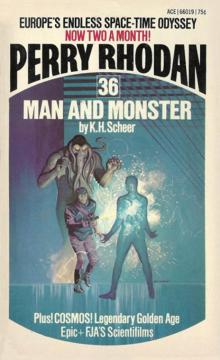 Man and Monster
Man and Monster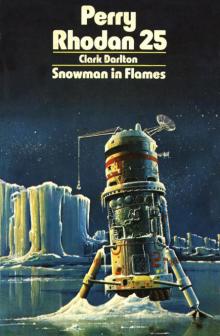 Snowman in Flames
Snowman in Flames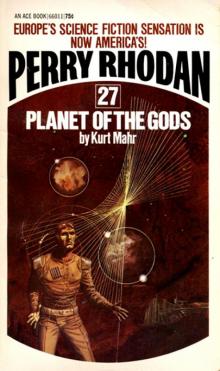 Planet of the Gods
Planet of the Gods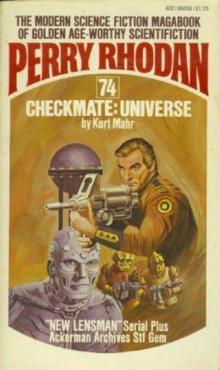 Checkmate Universe
Checkmate Universe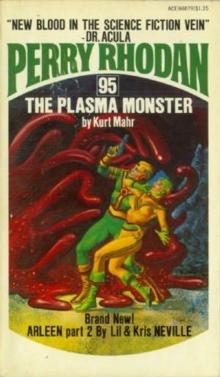 The Plasma Monster
The Plasma Monster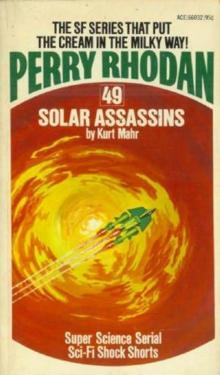 Solar Assassins
Solar Assassins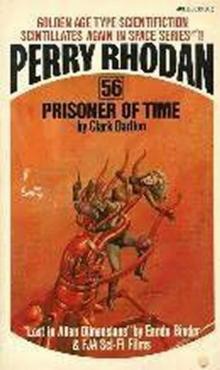 Prisoner of Time
Prisoner of Time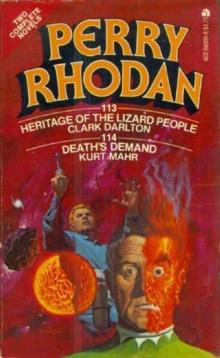 Death's Demand
Death's Demand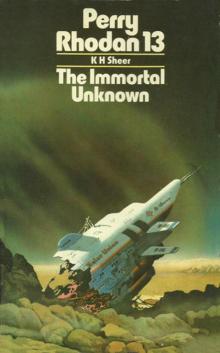 The Immortal Unknown
The Immortal Unknown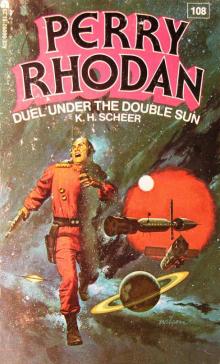 Duel Under the Double Sun
Duel Under the Double Sun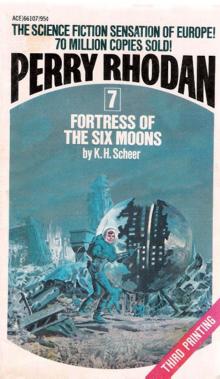 Fortress of the Six Moons
Fortress of the Six Moons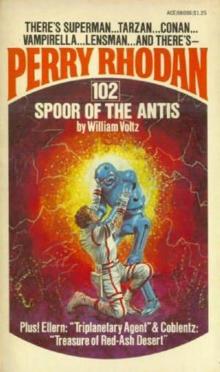 Spoor of the Antis
Spoor of the Antis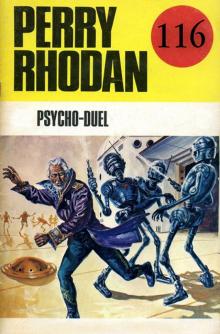 The Psycho-Duel
The Psycho-Duel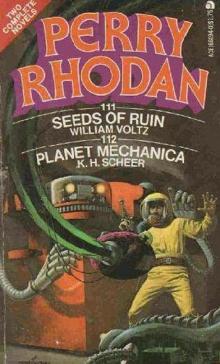 Planet Mechanica
Planet Mechanica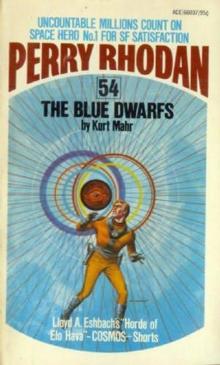 The Blue Dwarfs
The Blue Dwarfs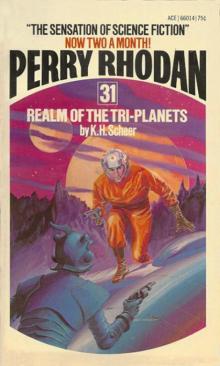 Realm of the Tri-Planets
Realm of the Tri-Planets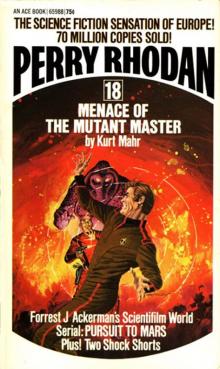 Menace of the Mutant Master
Menace of the Mutant Master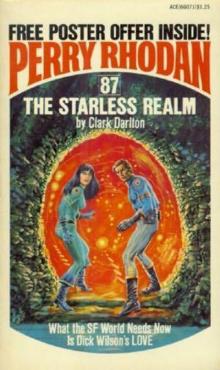 The Starless Realm
The Starless Realm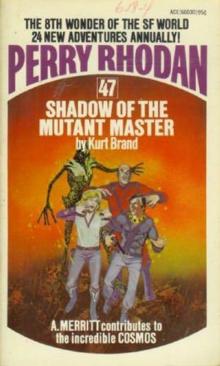 Shadow of the Mutant Master
Shadow of the Mutant Master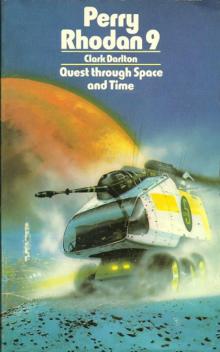 Quest Through Space And Time
Quest Through Space And Time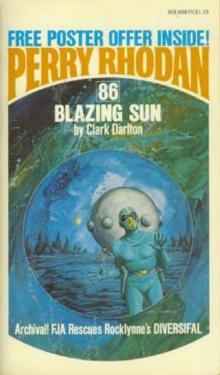 Blazing Sun
Blazing Sun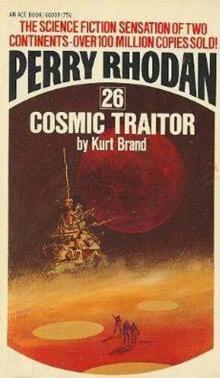 Cosmic Traitor
Cosmic Traitor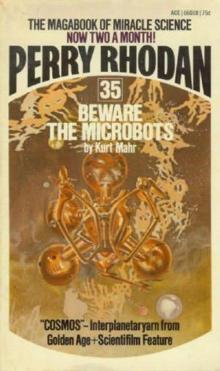 Beware the Microbots
Beware the Microbots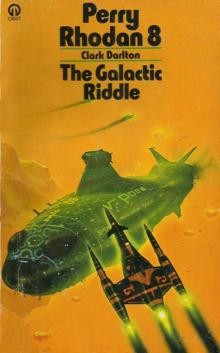 The Galactic Riddle
The Galactic Riddle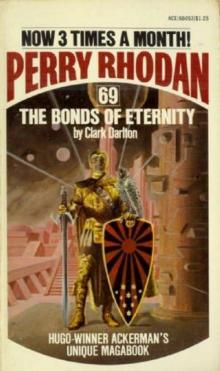 The Bonds of Eternity
The Bonds of Eternity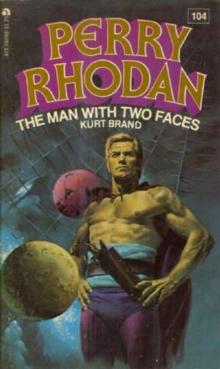 The Man With Two Faces
The Man With Two Faces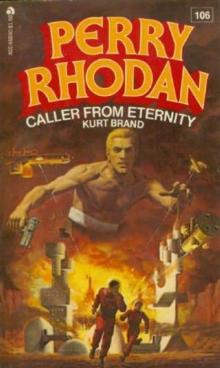 Caller from Eternity
Caller from Eternity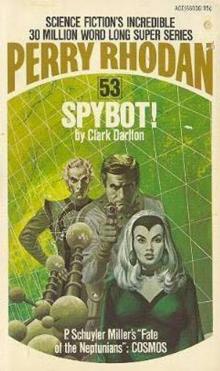 Spybot!
Spybot!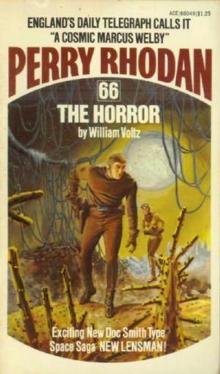 The Horror
The Horror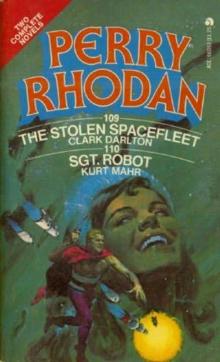 The Stolen Spacefleet
The Stolen Spacefleet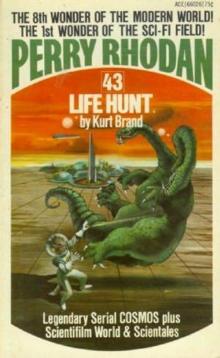 Life Hunt
Life Hunt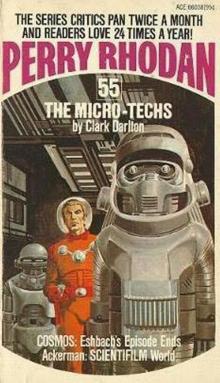 The Micro-Techs
The Micro-Techs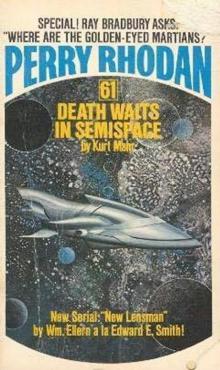 Death Waits in Semispace
Death Waits in Semispace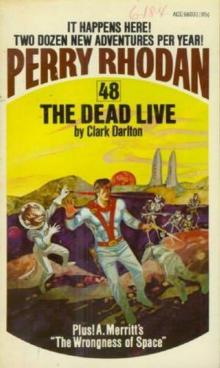 The Dead Live
The Dead Live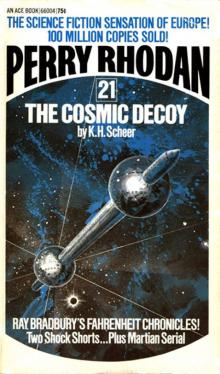 The Cosmic Decoy
The Cosmic Decoy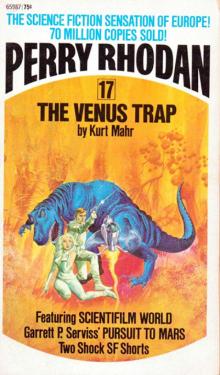 The Venus Trap
The Venus Trap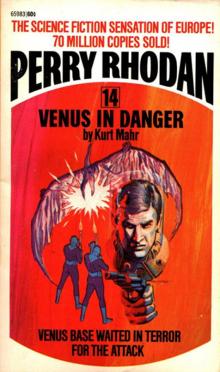 Venus in Danger
Venus in Danger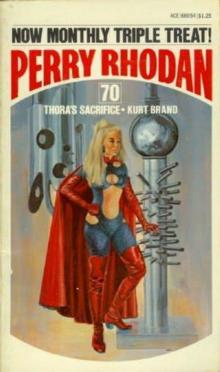 Thora's Sacrifice
Thora's Sacrifice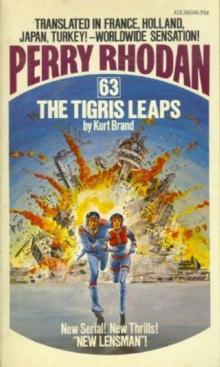 The Tigris Leaps
The Tigris Leaps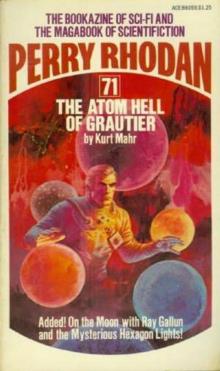 The Atom Hell of Grautier
The Atom Hell of Grautier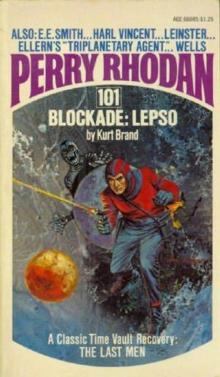 Blockade: Lepso
Blockade: Lepso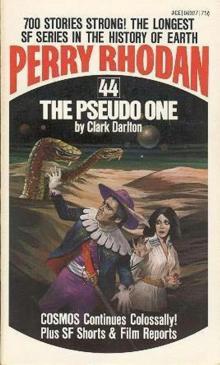 The Pseudo One
The Pseudo One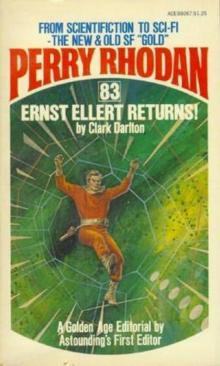 Ernst Ellert Returns
Ernst Ellert Returns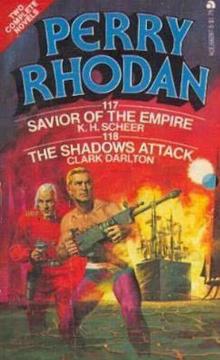 Savior Of The Empire
Savior Of The Empire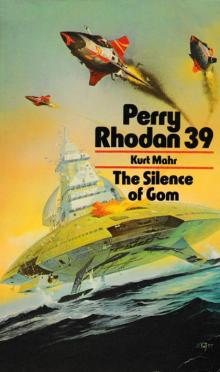 The Silence of Gom
The Silence of Gom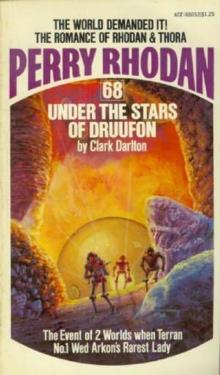 Under the Stars of Druufon
Under the Stars of Druufon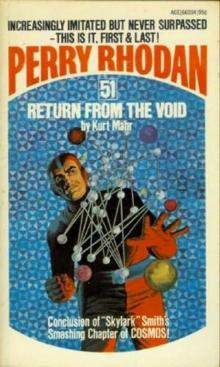 Return from The Void
Return from The Void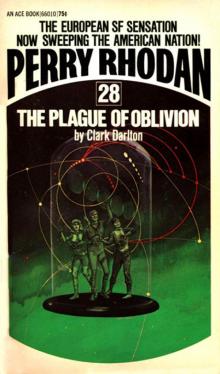 The Plague of Oblivion
The Plague of Oblivion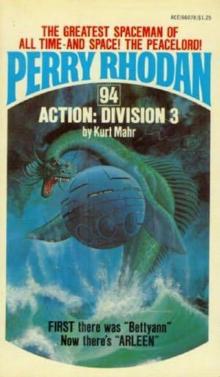 Action Division Three
Action Division Three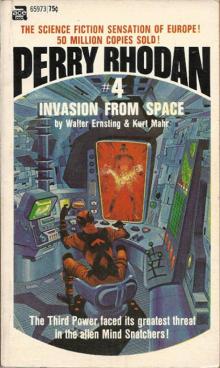 Invasion From Space
Invasion From Space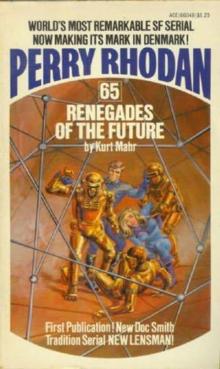 Renegades of the Future
Renegades of the Future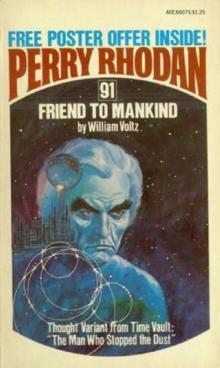 Friend to Mankind
Friend to Mankind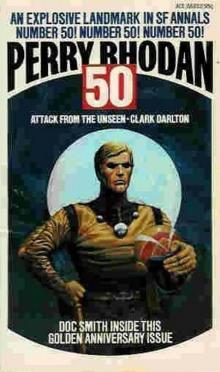 Attack from the Unseen
Attack from the Unseen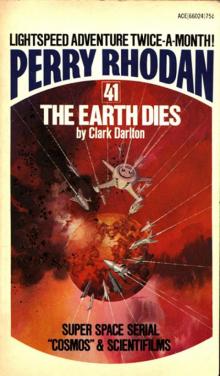 The Earth Dies
The Earth Dies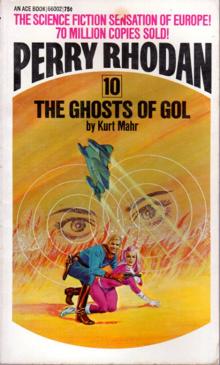 The Ghosts of Gol
The Ghosts of Gol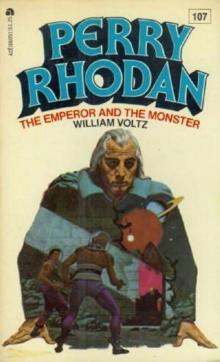 The Emperor and the Monster
The Emperor and the Monster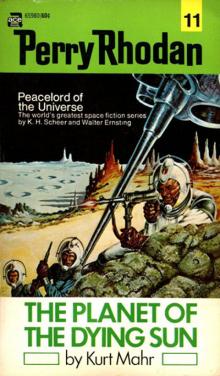 The Planet of the Dying Sun
The Planet of the Dying Sun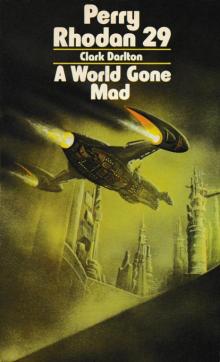 A World Gone Mad
A World Gone Mad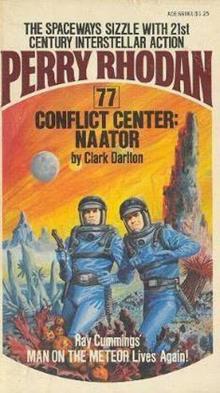 Conflict Center Naator
Conflict Center Naator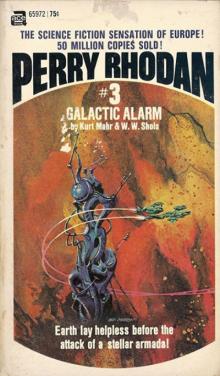 Galactic Alarm
Galactic Alarm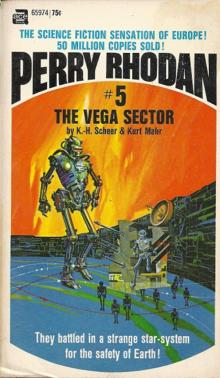 The Vega Sector
The Vega Sector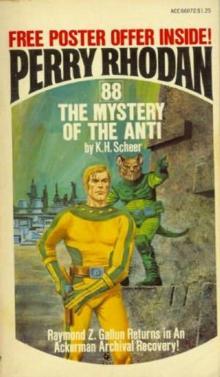 Mystery of the Anti
Mystery of the Anti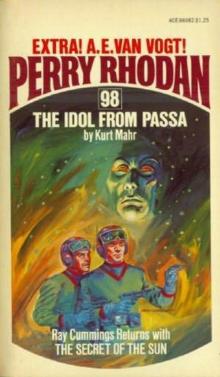 The Idol from Passa
The Idol from Passa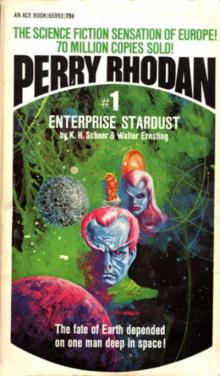 Enterprise Stardust
Enterprise Stardust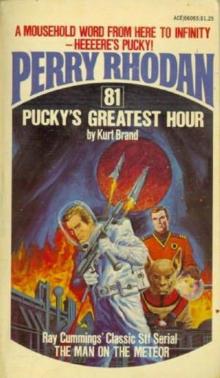 Pucky's Grestest Hour
Pucky's Grestest Hour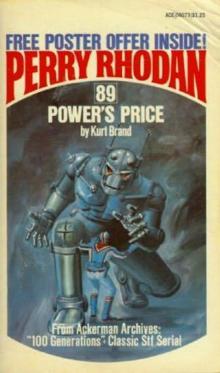 Power's Price
Power's Price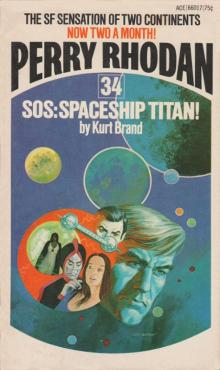 SOS Spaceship Titan
SOS Spaceship Titan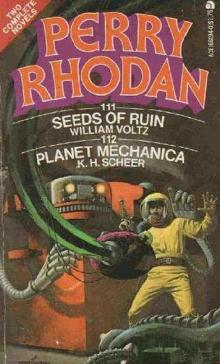 Seeds of Ruin
Seeds of Ruin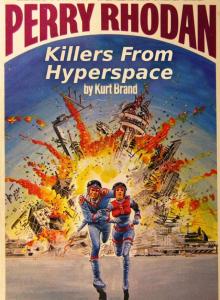 Killers From Hyperspace
Killers From Hyperspace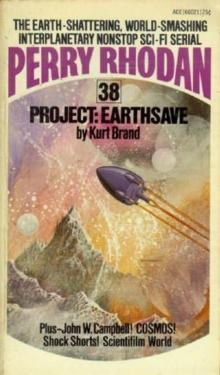 Project Earthsave
Project Earthsave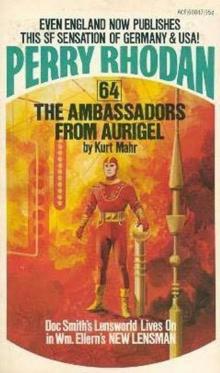 The Ambassadors from Aurigel
The Ambassadors from Aurigel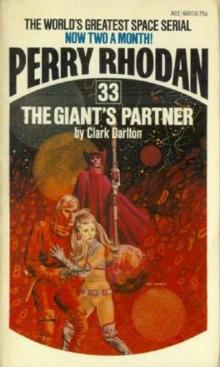 The Giant's Partner
The Giant's Partner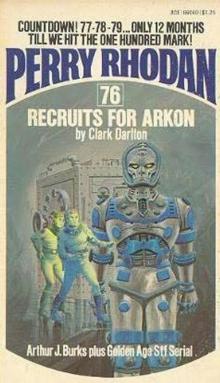 Recruits for Arkon
Recruits for Arkon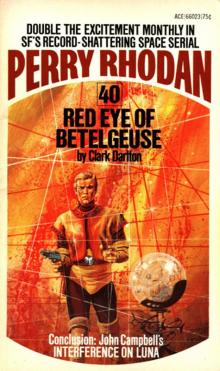 Red Eye of Betelguese
Red Eye of Betelguese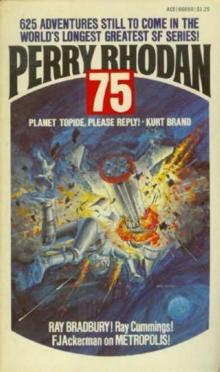 Planet Topide Please Reply
Planet Topide Please Reply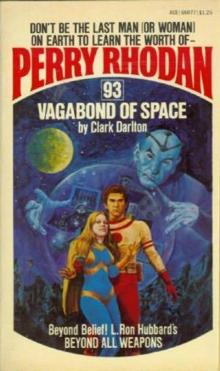 Vagabond of Space
Vagabond of Space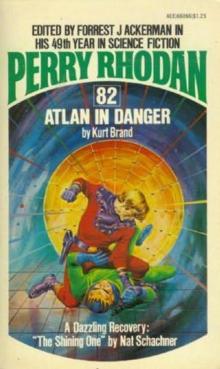 Atlan in Danger
Atlan in Danger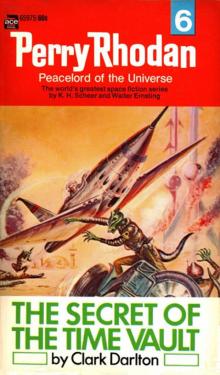 The Secret of the Time Vault
The Secret of the Time Vault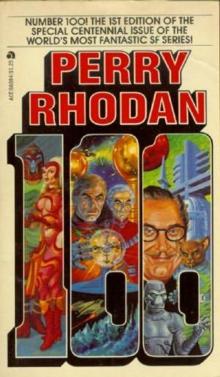 Desert of Death's Domain
Desert of Death's Domain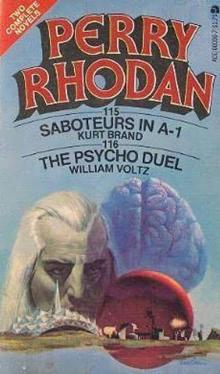 Saboteurs in A-1
Saboteurs in A-1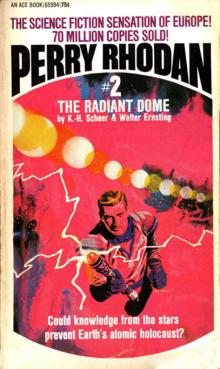 The Radiant Dome
The Radiant Dome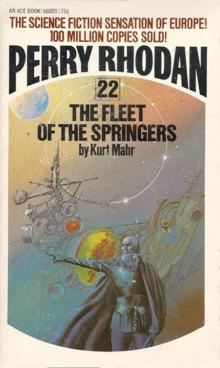 The Fleet of the Springers
The Fleet of the Springers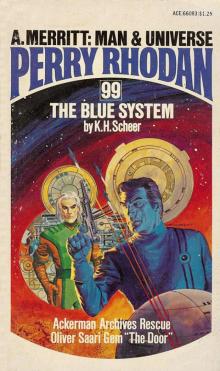 The Blue System
The Blue System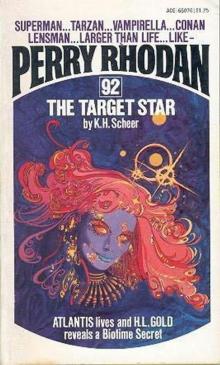 The Target Star
The Target Star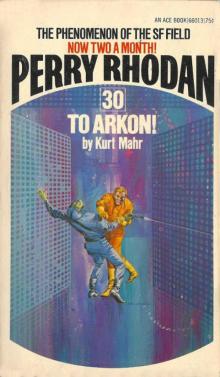 To Arkon!
To Arkon!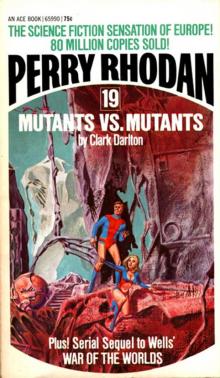 Mutants Vs Mutants
Mutants Vs Mutants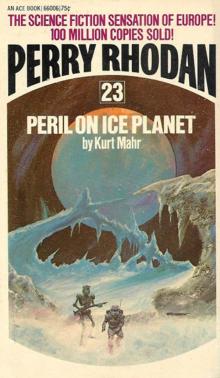 Peril on Ice Planet
Peril on Ice Planet Horn: Green
Horn: Green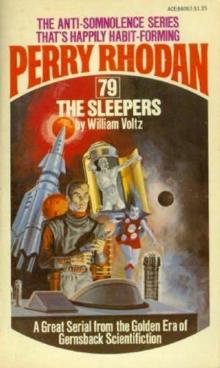 The Sleepers
The Sleepers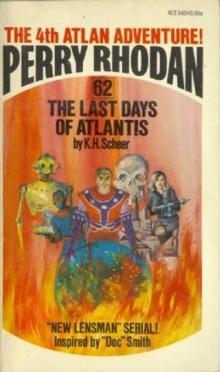 The Last Days of Atlantis
The Last Days of Atlantis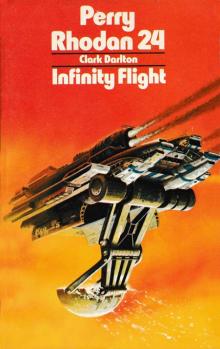 Infinity Flight
Infinity Flight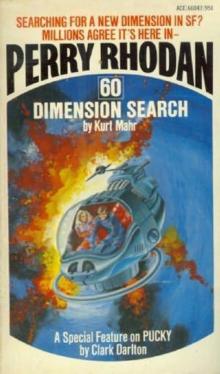 Dimension Search
Dimension Search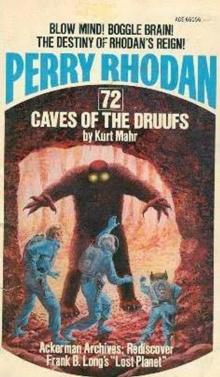 Caves of the Druufs
Caves of the Druufs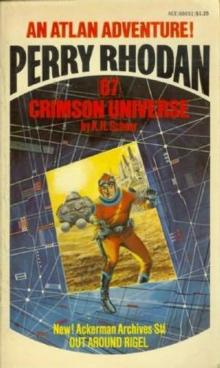 Crimson Universe
Crimson Universe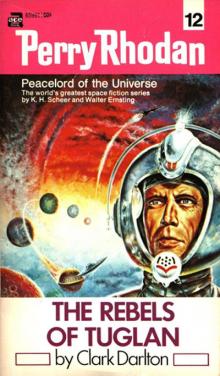 The Rebels of Tuglan
The Rebels of Tuglan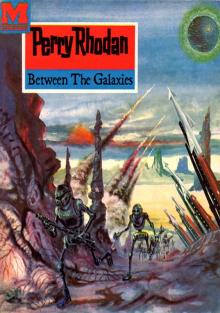 Between The Galaxies
Between The Galaxies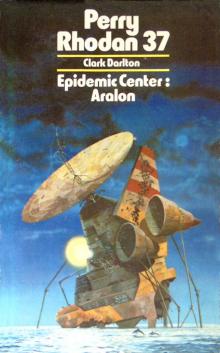 Epidemic Center Aralon
Epidemic Center Aralon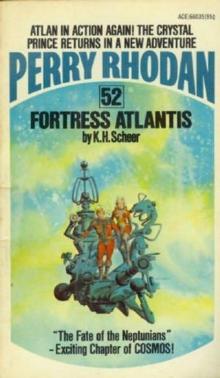 Fortress Atlantis
Fortress Atlantis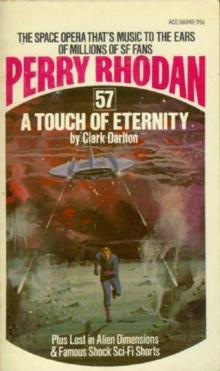 A Touch of Eternity
A Touch of Eternity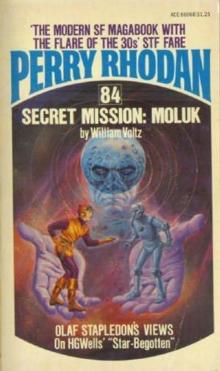 Secret Mission Moluk
Secret Mission Moluk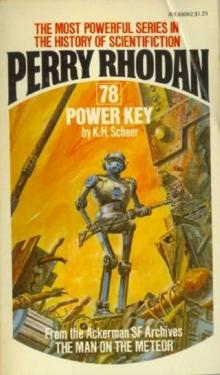 Power Key
Power Key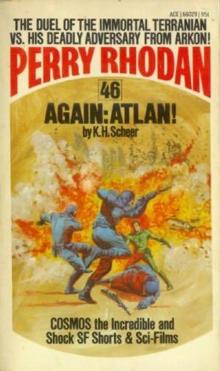 Again Atlan
Again Atlan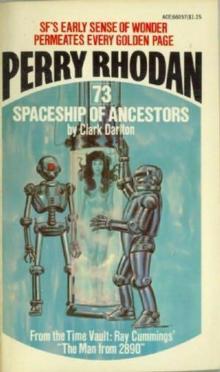 Spaceship of Ancestors
Spaceship of Ancestors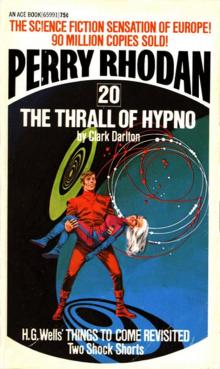 The Thrall of Hypno
The Thrall of Hypno